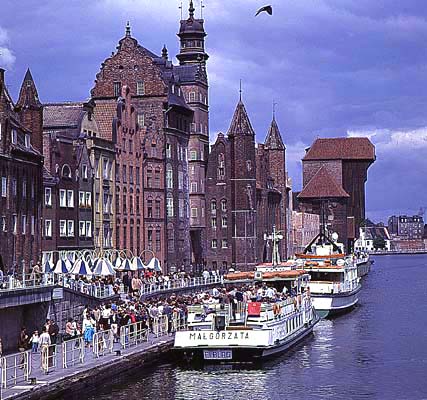Jump to: navigation, search
This article is about the country in Europe. For other uses, see Poland (disambiguation).
Republic of Poland
Rzeczpospolita Polska
Flag Coat of arms
Anthem: Mazurek Dąbrowskiego
(Dąbrowski's Mazurka, or "Poland Is Not Yet Lost")
Location of Poland (orange) – on the European continent (camel & white)
– in the European Union (camel) [Legend]
Capital
(and largest city) Warsaw
52°13′N 21°02′E / 52.217°N 21.033°E / 52.217; 21.033
Official languages Polish2
Demonym Pole/Polish
Government Parliamentary republic
- President Lech Kaczyński
- Prime Minister Donald Tusk
Formation
- Christianisation4 14 April 966
- Redeclared 11 November 1918
EU accession 1 May 2004
Area
- Total 312,679 km2 (69th3)
120,726 sq mi
- Water (%) 3.07
Population
- Dec. 2007 census 38,116,000[1] (33rd)
- Density 122/km2 (83rd)
319.9/sq mi
GDP (PPP) 2007 estimate
- Total $621.984 billion[2] (20th)
- Per capita $16,316[2] (49th)
GDP (nominal) 2007 estimate
- Total $422.090 billion[2] (21st)
- Per capita $11,072[2] (47th)
HDI (2006) ▲ 0.875 (high) (39th)
Currency Złoty (PLN)
Time zone CET (UTC+1)
- Summer (DST) CEST (UTC+2)
Drives on the right
Internet TLD .pl5
Calling code 48
1 See, however, Unofficial mottos of Poland.
2 Although not official languages, Belarusian, Kashubian, Lithuanian and German are used in 20 communal offices.
3 The area of Poland according to the administrative division, as given by the Central Statistical Office, is 312,679 square kilometres (120,726 sq mi) of which 311,888 square kilometres (120,421 sq mi) is land area and 791 square kilometres (305 sq mi) is internal water surface area.[1]
4 The adoption of Christianity in Poland is seen by many Poles, regardless of their religious affiliation or lack thereof, as one of the most significant national historical events; the new religion was used to unify the tribes in the region.
5 Also .eu, as Poland is a member of the European Union.
Poland /ˈpoʊlənd/ (help·info) (Polish: Polska), officially the Republic of Poland (Rzeczpospolita Polska), is a country in Central Europe. Poland is bordered by Germany to the west; the Czech Republic and Slovakia to the south; Ukraine, Belarus and Lithuania to the east; and the Baltic Sea and Kaliningrad Oblast, a Russian exclave, to the north. The total area of Poland is 312,679 square kilometres (120,726 sq mi),[1] making it the 69th largest country in the world and 9th in Europe. Poland has a population of over 38 million people,[1] which makes it the 33rd most populous country in the world.[3]
The establishment of a Polish state is often identified with the adoption of Christianity by its ruler Mieszko I in 966 (see Baptism of Poland), when the state covered territory similar to that of present-day Poland. Poland became a kingdom in 1025, and in 1569 it cemented a long association with the Grand Duchy of Lithuania by uniting to form the Polish-Lithuanian Commonwealth. The Commonwealth collapsed in 1795, and its territory was partitioned among Prussia, Russia, and Austria. Poland regained its independence in 1918 after World War I but lost it again in World War II, occupied by Nazi Germany and the Soviet Union. Poland lost over six million citizens in World War II, and emerged several years later as a socialist republic within the Eastern Bloc under strong Soviet influence. In 1989, communist rule was overthrown and Poland became what is constitutionally known as the "Third Polish Republic". Poland is a unitary state made up of sixteen voivodeships (Polish: województwo). Poland is also a member of the European Union, NATO and OECD

Historians have postulated that throughout Late Antiquity, many distinct ethnic groups populated the regions of what is now known as Poland. The exact ethnicity and linguistic affiliation of these groups has been hotly debated; in particular the time and route of the original settlement of Slavic peoples in these regions has been the subject of much controversy.
The most famous archeological find from Poland's prehistory is the Biskupin fortified settlement (now reconstructed as a museum), dating from the Lusatian culture of the early Iron Age, around 700 BC



Poland’s topographyPoland’s territory extends across several geographical regions. In the northwest is the Baltic seacoast, which extends from the Bay of Pomerania to the Gulf of Gdansk. This coast is marked by several spits, coastal lakes (former bays that have been cut off from the sea), and dunes. The largely straight coastline is indented by the Szczecin Lagoon, the Bay of Puck, and the Vistula Lagoon. The center and parts of the north lie within the North European Plain. Rising gently above these lowlands is a geographical region comprising the four hilly districts of moraines and moraine-dammed lakes formed during and after the Pleistocene ice age. These lake districts are the Pomeranian Lake District, the Greater Polish Lake District, the Kashubian Lake District, and the Masurian Lake District. The Masurian Lake District is the largest of the four and covers much of northeastern Poland. The lake districts form part of the Baltic Ridge, a series of moraine belts along the southern shore of the Baltic Sea. South of the Northern European Lowlands lie the regions of Silesia and Masovia, which are marked by broad ice-age river valleys. Farther south lies the Polish mountain region, including the Sudetes, the Cracow-Częstochowa Upland, the Świętokrzyskie Mountains, and the Carpathian Mountains, including the Beskids. The highest part of the Carpathians is the Tatra Mountains, along Poland’s southern border

